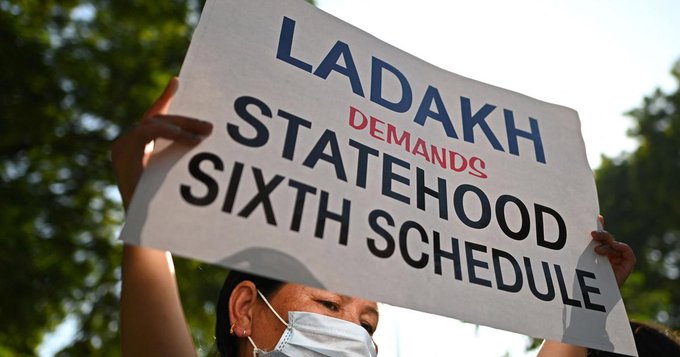JAMMU, Aug 9: The Leh Apex Body (LAB) and Kargil Democratic Alliance (KDA) will hold crucial joint meeting at Leh on August 11 to take call on future course of action on their demand for Sixth Schedule and Statehood while the Union Tribal Affairs Ministry today evaded a direct reply on grant of Sixth Schedule to the Union Territory of Ladakh saying it falls under administrative jurisdiction of the Ministry of Home Affairs.
LAB co-chairman Chering Dorjey Lakrook and KDA senior leader Sajjad Kargili told the Excelsior on telephone that the two bodies will hold joint sitting at Leh on August 11 to discuss next course in the aftermath of no headway by the MHA on their demand for grant of Sixth Schedule status and Statehood to Ladakh.
“LAB will host the meeting this time. We will discuss the issues and decide our strategy,” Lakrook said.
Kargili said almost all 11 members of the KDA will go to Leh to attend the meeting. A decision on Sixth Schedule, Statehood and other issues will be taken collectively, he added.
This will be first joint meeting of LAB and KDA post Parliamentary elections in Ladakh which the BJP lost after winning the seat for two consecutive terms of 2014 and 2019.
There are indications that the Central Government could empower Leh and Kargil Autonomous Hill Development Councils for protection of land, culture, jobs etc of Ladakh people, announce two or four new districts, bring Boti language under eighth schedule, give dedicated PSC and address employment related and other issues of the UT but won’t agree to the demand for Sixth Schedule and Statehood.
Meanwhile, in response to a question by two Congress MPs Saptagiri Sankar Ulaka and Tanuj Punia, Union Minister of State for Tribal Affairs Durgada Uikey said in Lok Sabha that the matter of the Sixth Schedule under Article 244(2) of the Constitution for the UT of Ladakh falls under the administrative jurisdiction of the Ministry of Home Affairs (MHA).
The MPs had asked whether the Government intends to extend the provisions of the Sixth Schedule of the Indian Constitution to Ladakh, and the reasons behind the delay in granting tribal area status to the UT.
Uikey said the MHA informed that democratic representation and decision-making powers of the LAHDCs have been retained after the formation of the Union Territory.
“Periodic elections for the Hill Development Councils, Panchayati Raj Institutions, and Members of Parliament are being conducted to ensure continued democratic representation in the UT,” he said.
Asserting that the LAHDCs exercise executive powers over various subjects within their respective districts, the Tribal Affairs Minister said as per mandate of the Ladakh Autonomous Hill Development Council Act, 1997, the LAHDCs function as District Planning and Development Boards and independently prepare plans for different programmes and policies of the UT, taking into account the demands and aspirations of the people.
He said the democratic representation and decision-making powers of the Hill Development Councils of Ladakh have been retained following the formation of the Union Territory of Ladakh in 2019.
These LAHDCs continue to exercise executive powers over different subjects within their respective districts, the Government also said in response to a query regarding the extension of tribal area status to the Union Territory (UT).
“The MHA is providing adequate funds to the LAHDCs through budgetary grants to the UT of Ladakh. The CAPEX allocation to these Councils has been increased from Rs 183 crore in 2019-20 to Rs 600 crore in 2023-24 to meet their funding requirements for developmental activities in their respective districts,” he said.
The Union Minister said the MHA has set up a high-powered committee under the Minister of State for Home Affairs for Ladakh to ensure protection of the region’s unique culture, language, land and employment.




